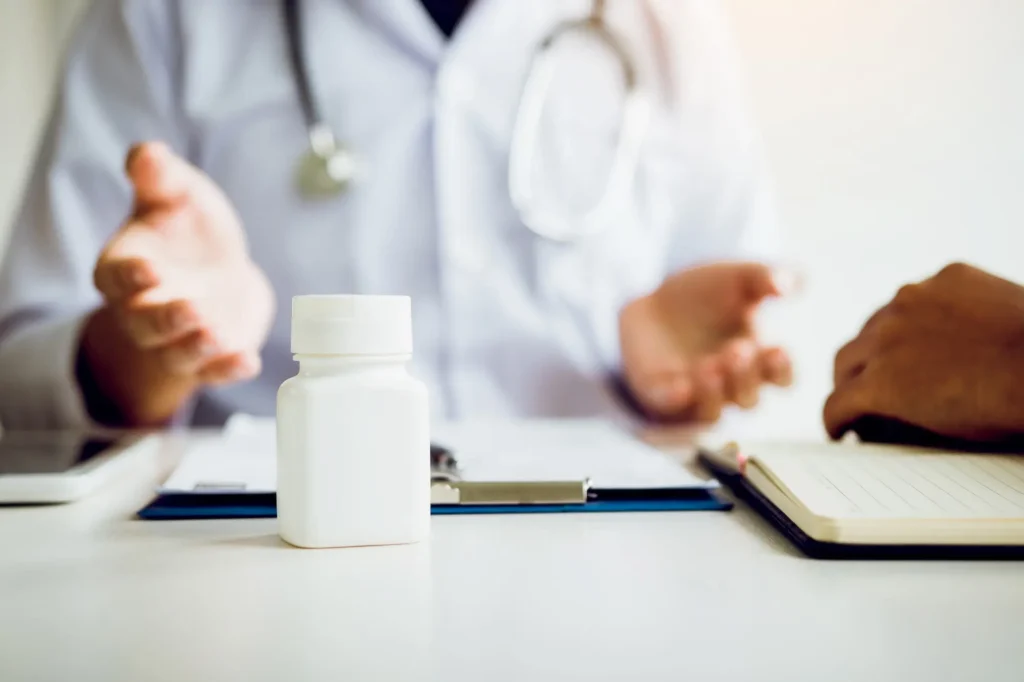Home / Addiction Treatment / Medication-Assisted Treatment (MAT)
Medication-Assisted Treatment for
Addiction in NH
Medication-assisted treatment, or MAT, can make a big difference in early recovery. At Heartfelt Recovery Centers in New Hampshire, we combine medication with therapy to help people feel more stable and supported as they heal.
What Is MAT Addiction Therapy?
MAT uses FDA-approved medications alongside therapy to treat substance use disorders. It’s most commonly used for alcohol use disorder and opioid use disorder, especially during the early stages of treatment. These medications reduce cravings and ease withdrawal symptoms, making it easier to focus on recovery.
Research shows that MAT is highly effective. According to the Substance Abuse and Mental Health Services Administration (SAMHSA), MAT helps people stay in treatment longer and lowers the chance of returning to substance use. MAT is often used as part of a medical detox process, where care teams monitor and support you as substances leave your system. This approach helps people start recovery with more comfort, safety, and support.
Medication-Assisted Alcohol Withdrawal
Alcohol withdrawal can be more than uncomfortable: it can be dangerous. In some cases, people may face seizures, hallucinations, or a serious condition called delirium tremens (DTs). These risks make it difficult to quit drinking alone.
MAT for alcohol addiction uses medications that help reduce these symptoms and lower the chance of complications. Combined with counseling and regular check-ins, it helps people start recovery with fewer barriers and more hope.
MAT Therapy for Opioid Addiction
Opioid withdrawal can bring on intense flu-like symptoms, pain, anxiety, and powerful cravings. For those living with opioid addiction, including addiction to heroin or prescription painkillers, this can be a major barrier to getting better.
MAT offers a way through. With medications that stabilize the body and calm the brain, people can take the first step without being overwhelmed by withdrawal. It also lowers the risk of overdose and gives people a better chance of staying on the path to long-term recovery.
MAT Medications
Several medications are used in MAT, depending on the substance involved. These medications don’t replace one drug with another; they’re carefully prescribed to reduce harm and support healing. All are FDA-approved and used as part of a full treatment plan.
Medications for Alcohol Use Disorder
For alcohol addiction, common medications include:
- Naltrexone, which blocks the pleasurable effects of alcohol and helps to reduce cravings
- Acamprosate, which helps restore brain balance after someone stops drinking
- Disulfiram, which causes unpleasant symptoms if alcohol is consumed, acting as a strong deterrent
These medications all work in different ways, and your care team will help decide what’s best for you. They’re most effective when paired with counseling and support groups.
Medications for Opioid Use Disorder (MOUD)
For opioid addiction, including heroin and prescription opioids, MAT includes:
- Methadone, which relieves withdrawal and blocks opioid effects
- Buprenorphine, which eases symptoms and reduces cravings
- Suboxone medication, a combination of buprenorphine and naloxone that lowers misuse potential while supporting recovery
These medications help people find stability without the highs and crashes of opioid misuse. Again, medications are most effective when used with counseling and regular support.
Medications for Other Substance Use Disorders
While MAT is primarily used for alcohol and opioid use, some medications are being explored for other types of addiction, such as stimulants or sedatives. These are still considered on a case-by-case basis and only under medical supervision.
Benefits of Medication-Assisted Treatment
MAT offers real benefits that help people stay on track and feel better faster:
Eases withdrawal and cravings
Medications can reduce the worst physical symptoms, making recovery less overwhelming
Keeps people in treatment longer
According to SAMHSA, people in MAT are more likely to stay engaged in their program
Reduces relapse and overdose risk:
According to the NIH, MAT can cut the risk of overdose death for certain substances by over 50%
Supports therapy and mental health
Many people with addiction also face anxiety, depression, or trauma. MAT works well alongside addiction therapy to support dual diagnosis recovery
Improves stability and well-being
When people feel physically better, they’re more able to focus on healing, relationships, and the future
Our MAT Program Levels of Care at Heartfelt Recovery, NH
At Heartfelt Recovery Centers, we provide MAT across several outpatient levels of care. We tailor treatment based on where you are in your recovery journey.
- Partial Hospitalization Program (PHP): Full-day care, five days a week, while returning home at night
- Intensive Outpatient Program (IOP): More structured care, including multiple sessions each week
- Outpatient Program (OP): A flexible option with scheduled therapy while living at home
- Inpatient referrals: If you need detox or 24/7 residential care, we’ll connect you with a trusted facility in New Hampshire
Based in New Hampshire? Enter MAT Therapy Today
At Heartfelt Recovery Centers, we offer more than medication: we offer hope. Our MAT programs are built around each person’s needs, combining professional care with warmth and understanding. Whether you’re just starting out or have tried before, we’re here to support you with tools that work.
Let us help you take the first step. Contact us today and begin a recovery path that’s built around your needs, at your pace.
FAQs
Is medication-assisted treatment safe?
Yes. MAT uses FDA-approved medications and is overseen by licensed professionals.
Does medication-assisted treatment work?
Absolutely. Research shows it helps people stay in treatment, feel better sooner, and avoid relapse.
Is medication-assisted treatment evidence-based?
Yes, organizations like SAMHSA and the CDC support MAT as an effective approach to treating addiction.
Do all rehab programs have medication assisted treatment?
No. Some programs don’t offer MAT, so it’s important to ask before enrolling.
How long will I need MAT?
It depends on your situation. Some people benefit from short-term use, while others need longer support.
Will MAT cure addiction?
There’s no “cure,” but MAT helps people manage symptoms and build a life in recovery.
Does MAT include therapy?
Yes. MAT always includes counseling and therapy to address emotional and mental health needs.
How do I get started with MAT at Heartfelt Recovery?
Just give us a call or send a message. We’ll schedule a free consultation, learn more about your goals, and help you take the next step.
View Our Resources
Written by MD Mitchell Grant Cohen Countless nights staring at the ceiling, worried about someone special, can be exhausting. It could...
Written by MD Mitchell Grant Cohen Over the past decade, the United States has been facing a substantial drug crisis. Opioid...
Written by MD Mitchell Grant Cohen Searching for effective rehab for couples New Hampshire? You’ll find that New Hampshire offers unique,...





